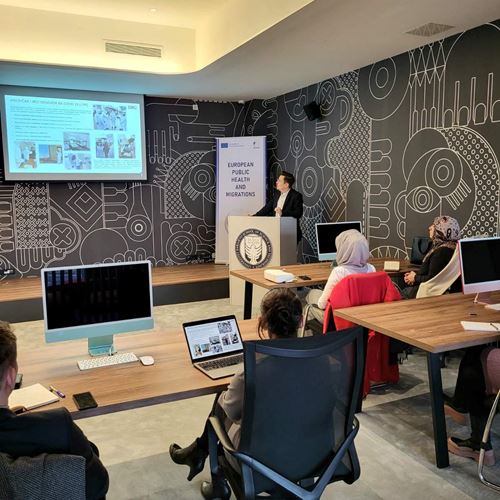The involvement of stakeholders from Bosnia and Herzegovina, including government organizations and NGOs, journalists, medical and humanitarian workers working with migrants, refugees, and asylum seekers, involved in projects concerning the public health of people on the move were in focus.
Dr. Marko Isajlović, DRC medical advisor held the presentation on the Danish Refugee Council's contribution to the health segment of mixed migration response in Bosnia and Herzegovina, emphasizing that health services provided to the people on the move in temporary reception centers and local health institutions are in accordance to EU public health standards and with the same quality as for the local population
“DRC medical professionals, together with the doctors and nurses from the local health centers, are present in reception centers 24/7, during this year we have provided around 30.000 basic medical and nursing care assistance. The most common morbidities reported among the population accommodated in centers are respiratory diseases (18%), musculoskeletal diseases (15%), skin diseases (13%), certain infectious and parasitic diseases (12%), and diseases of the digestive system (11%),” says dr Isajlović.
All preventive measures are implemented in order to stop the spread of COVID-19 in the centers, including the establishment of isolation areas, mandatory “entry-screenings” for all new arrivals, as well as accessible testing and treatment of suspect and positive cases. The sanitary-epidemiological situation in the center is satisfactory, due to the strong cooperation with public health institutes across the country.
“Biggest challenge in ensuring quality health care in reception centers is a high turnover of patients, as well that some centers like Lipe are remote from other health institutions. Due to this remoteness, in order to ensure immediate attendance to medical emergencies, DRC medical professionals are present on the site 24/7. Additionally, several patients needing continuous care are accommodated inside medical units, and are provided with chronic treatment and nursing care non-stop,” concludes Isajlović.
DRC scales up winterization in temporary reception centers to urgently respond to the needs of affected people, so there is more medical and protection staff present to prioritize the most vulnerable including families with small children, unaccompanied minors, and elders.
